Let’s talk about testimonial marketing – or as I like to call it, the most underutilized goldmine hiding in plain sight on your website.
If you've been copy-pasting a few nice customer quotes into your homepage footer and calling it a day, this post is your intervention. No shade, I’ve been there. It's easy to treat customer testimonials like decor instead of what they really are: conversion power tools.
Most people use testimonials like background noise. But today, you’ll learn how to use them like a sales tool. Let’s get into it.
What Testimonial Marketing Really Is — and What Everyone Gets Wrong
Let’s start by clearing something up: testimonial marketing isn’t just about tossing a few nice words onto your site and hoping for the best. People love to talk about “building trust” and “adding social proof,” and yes, that’s part of it—but if your testimonials aren’t nudging someone closer to a decision, they’re not doing their job.
Too many businesses treat testimonials like background noise. A polite quote here, a slider there—something to scroll past on the way to the CTA. Meanwhile, 99.9% of customers read reviews before buying, and testimonials can boost conversions by up to 270%. That’s not fluff. That’s fuel. You just need to use it properly.
A strong testimonial should do at least one of these things:
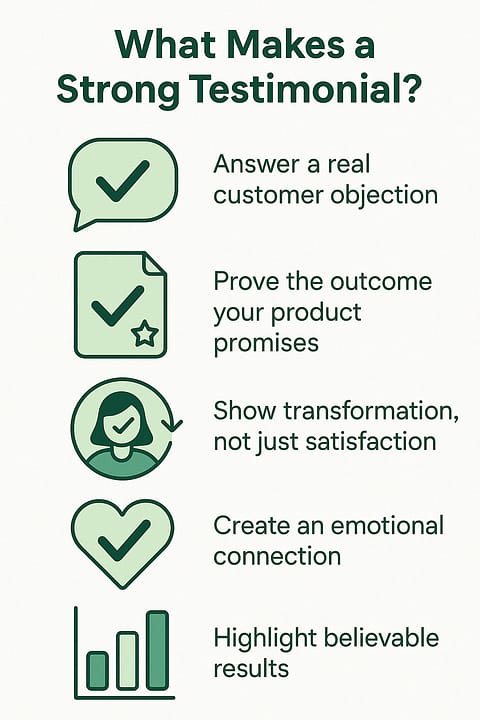
Want proof? Look at landing pages that convert. You’ll notice they don’t skip testimonials—they use them to back up bold claims, build credibility, and reinforce value throughout the page.
Thrive Themes does this beautifully on the Thrive Suite landing page—testimonials are featured within the first third of the page, right where curiosity meets credibility.
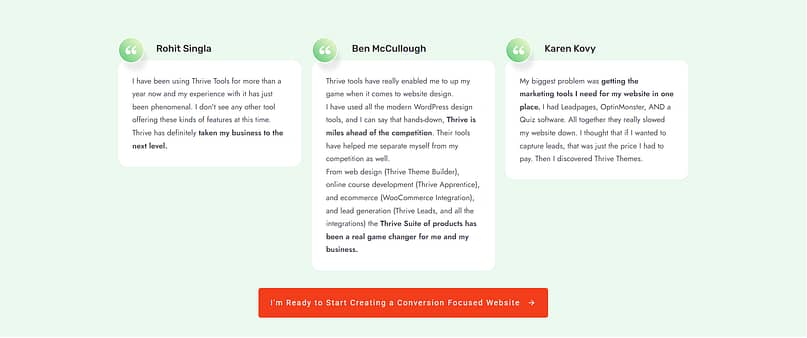
Notice what comes right after: a bold call-to-action. That’s not just good timing—it’s intentional. When trust is high and belief is fresh, that’s the perfect moment to ask for the click.
This is what separates decoration from strategy.
“If your testimonials aren’t doing heavy lifting, they’re just hanging around looking pretty.”
The Real Reason Testimonials Work: Psychology, Not Popularity
Let’s get one thing straight. Testimonial marketing isn’t just about showing off how many people like you. It works because of how our brains are wired.
Yes, there’s social proof at play — we trust what others say more than what brands say about themselves. And we don’t trust easily, either. According to Statista, the average consumer reads 10 reviews before deciding to trust a business. That’s not just casual browsing. That’s active belief-building.
But surface-level praise isn’t enough. The testimonials that actually convert tap into something deeper.
Here’s what’s really happening when a good testimonial does its job:
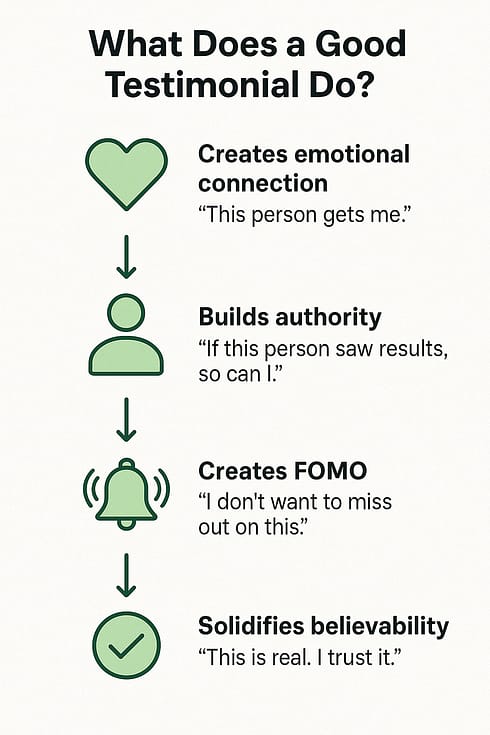
Quick gut check: Read through your current testimonials.
- Do they answer doubts?
- Do they show before and after?
- Do they feel like real humans wrote them?
- If not, you’ve got work to do.
🎯 Not sure how to ask for the kind of testimonials that actually convert?
Check out our step-by-step tutorial: How to Ask for Testimonials Without Feeling Weird About It. You'll get a step-by-step guide on how to get reviews from your customers without any awkward begging, chasing, or cringey “say something nice about us” vibes.
Showcase Your Testimonials the Smart Way (Not the Lazy Way)
Let’s be honest. Most websites treat testimonial marketing like it’s optional. A nice touch. A little sprinkle of praise here, a slider there, maybe a “Great product!” quote tucked into the footer.
That’s not strategy. That’s decoration.
If you want testimonials to work, they need to be part of your conversion rate optimization strategy. And luckily, there are some low-effort, high-impact fixes that make a huge difference—without needing to rewrite your whole website.
🧰 Your Testimonial Marketing Strategy Is Only as Solid as the System Behind It
Here’s the truth no one likes to admit: collecting testimonials sounds simple — until you actually try to do it consistently.
That’s why I highly recommend Thrive Ovation. It’s not just a tool — it’s the backbone of a testimonial strategy that actually works without burning you out.
I’ve tried the spreadsheets. The comment screenshots. The “I’ll circle back to this DM later” method. They all work... until they don’t. Thrive Ovation fixes that by giving you one place to collect, tag, sort, and display your testimonials — automatically.
Here’s why it’s my go-to:
And yes, you can even pull testimonials from social media and email — which means fewer awkward follow-ups, and more conversions from the proof you already have.
If you’re serious about testimonial marketing, this is the system that makes it sustainable.
Let’s start with the low-hanging fruit.
Low-Hanging Fruit: Fix These Common Mistakes First
Before you start overhauling your entire site, start here. These are the quick wins — the easy fixes that can instantly make your testimonial marketing more effective.
Generic praise vs. specific outcomes
“Saying ‘Great product’ is useless. Saying ‘I doubled my opt-ins after switching to Thrive Leads’ gets attention.” → Look for quotes that mention results, transformations, or before-and-after shifts.
Here’s an example from Louise Parker’s, a well-known fitness specialist, website. Her testimonials are emotion-packed and truly show that her clients love her work.
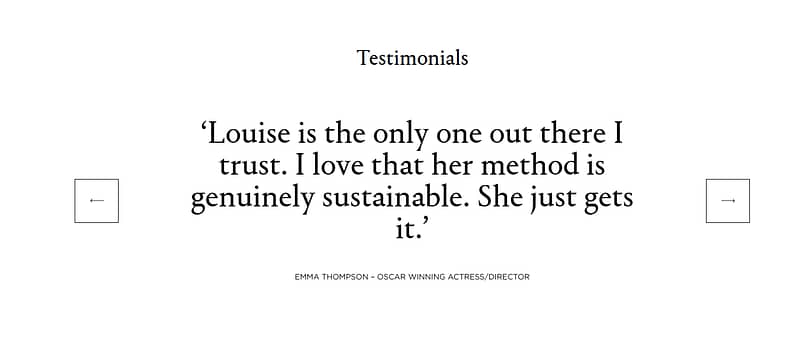
Hidden vs. hero placement
Stop burying your best user-generated content on your About page. → Place testimonials where decisions happen:
Semrush adds several strong testimonials to their pricing page, right after listing what each plan includes. That way, hesitant buyers can be affirmed by real customer reviews before making their purchase decision.
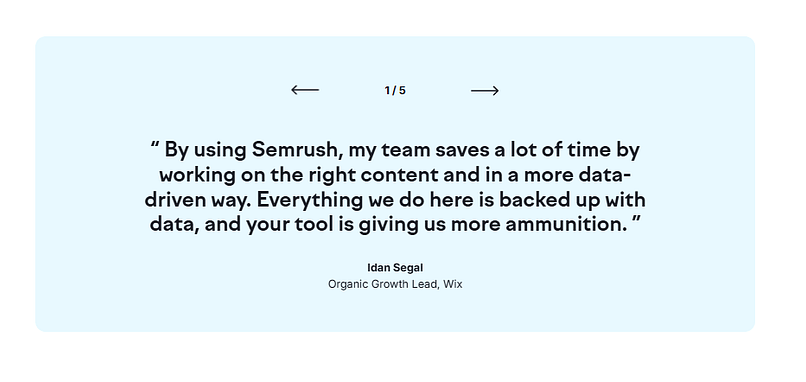
Static quotes vs. dynamic assets
If you’re showing the same three testimonials to everyone, you’re leaving money on the table. → Rotate based on the product, funnel stage, or customer segment.
For example, the testimonials Thrive Themes features on their Thrive Architect landing page…
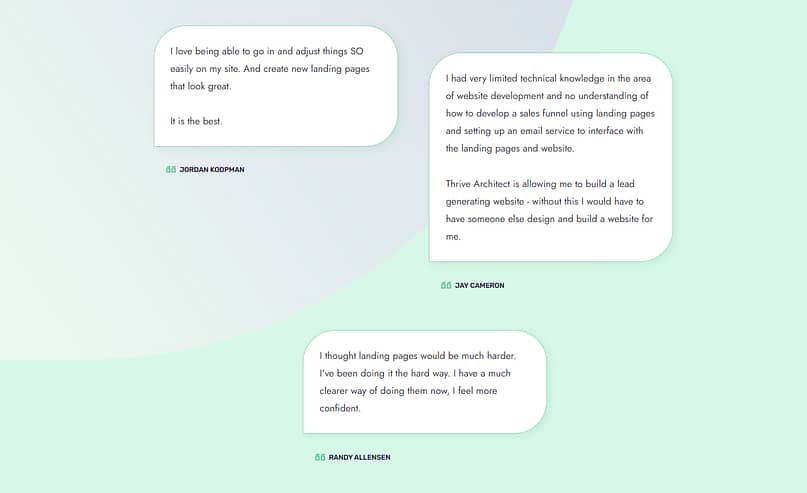
Are not the same testimonials you’ll find on their Thrive Theme Builder landing page…
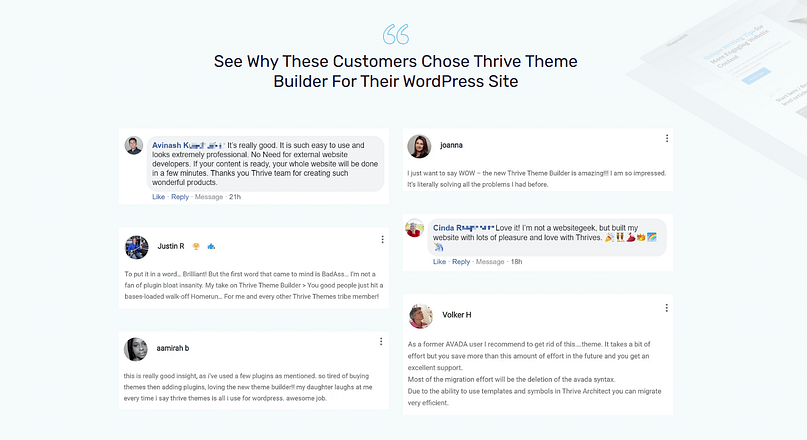
If you already have decent testimonials, you’re halfway there. But where and how you show them matters just as much as what they say.
And if you need help with collecting and displaying your testimonials in a seamless way, this step-by-step guide can help.
The 3-Layer Testimonial System That Drives Conversions
Here’s where most people stop: they collect a few decent customer testimonials, drop them somewhere on the site, and call it good.
But here’s the thing — 60% of people say the number of reviews matters when making a decision.
A single glowing quote won’t cut it. If you really want to use testimonial marketing to drive conversions, you need a system. Not just a stash of nice words, but a plan for using the right proof at the right time, in the right format.
I call it the 3-Layer Testimonial System. Think of it as a funnel that matches your customer’s journey—awareness, consideration, decision—with the kind of testimonial that will move them forward.

Oh, and remember how I told you you can automate large parts of these tasks? Take a look at Thrive Ovation - it puts testimonial collection and display on autopilot, but don’t worry I’ll explain more as we go through the details.
Layer 1 – Quick Hits for Awareness
At this stage, your goal is to get attention and spark curiosity.
Use Thrive Ovation to store all your testimonials in one central hub. You can easily scan through, tag them by topic or product, and quickly spot the ones that are perfect for fast-hitting quotes. It also makes collecting testimonials ridiculously easy — more on that in a minute.
Layer 2 – Consideration Builders
Now your reader is warming up. They’re evaluating, comparing, and asking, “Will this actually work for me?”
🎯 Thrive Ovation makes this easy by letting you tag and filter testimonials based on product, customer type, or funnel.
Layer 3 – Decision Pushers
This is where the magic happens. Someone is almost ready to buy, but still needs reassurance.
Pro Tip: Using Thrive Ovation, you can build a testimonials page that updates automatically as new social proof rolls in. No need to manually swap out quotes — just tag them once, and let your page stay fresh and conversion-ready on its own.
Testimonial Formats That Actually Convert (And Where to Use Each)
Not all testimonials are created equal. Some formats grab attention. Others build emotional connection. And some are perfect for that final push to buy.
The trick is knowing which format to use at each stage of the funnel—and how to make each one feel like it belongs.
Here’s a quick breakdown:
Format | Best For | Where to Use It | Pro Tip |
|---|---|---|---|
Short text quote | Quick credibility hits | Homepage, blog sidebars, email opt-ins | Use as callouts next to headlines or CTAs |
Text + image | Building trust and relatability | Feature pages, landing pages, comparison tables | Real face = real connection |
Video testimonial | Emotional impact + proof | Sales pages, pricing pages, retargeting ads | Highlight key moments in the video above the fold |
User-generated content (UGC) | Authenticity + social proof | Social feeds, popups, checkout bumps | Screenshot and drop it in with light editing |
User-generated content (UGC) | High-ticket offers or B2B | Sales decks, webinar follow-ups, testimonial pages | Tell a full before/after transformation story |
How to Collect High-Converting Testimonials (Without Chasing People or Feeling Awkward)
Let’s get one thing out of the way: asking for testimonials can feel weird.
No one wants to be the desperate “Hey, could you say something nice about me?” person. And even when customers want to say something, it’s often hard to catch them at the right moment. Timing, phrasing, follow-up—it’s a lot.
So instead of winging it or chasing people down one awkward email at a time, let’s talk about how to collect testimonials like someone who has a system, not a panic attack.
Ask the Right Way, at the Right Time
The key to getting great customer testimonials? Don’t wait too long—and don’t overthink it.

Find Gold in the Content You Already Have
Chances are, you’re sitting on user-generated content that would make perfect testimonials.
🎯 This is testimonial mining 101—and it’s way more effective than begging people to “say something nice.”
📥 Pro Tip: Already have glowing reviews on platforms like Google, Yelp, or Trustpilot?
You don’t have to start from scratch. One of the easiest ways to bring those reviews into your site is by using a dedicated reviews plugin (I recommend Smash Balloon). It lets you import and display third-party reviews directly on your pages — no copy-paste chaos, no design headaches.
👉 Check out this tutorial: How to Add Google Reviews to Your WordPress Site Without Breaking the Layout
It’s a great way to blend outside social proof with your on-site testimonial marketing strategy — and yes, it works beautifully with Thrive tools too.
Use Incentives the Ethical Way
Sometimes people just need a nudge. That’s fine. But keep it honest.
🧠 Bottom line: collecting testimonials shouldn’t feel gross. With the right timing and a little automation, it won’t.
Advanced Use Cases: Ways to Use Testimonials You Haven’t Thought Of (Yet)
If you’re only using testimonials on your homepage and sales page, you’re leaving a whole buffet of persuasive moments untapped.
Once you start thinking of testimonials as flexible, strategic tools—not fixed quotes—you’ll start seeing opportunities everywhere. Here are a few creative ways to stretch your testimonial marketing muscles.
1. Turn Testimonials Into Headlines
Most pages bury their testimonials further down — near the CTA, the pricing table, or waaaay in the footer. But what if you flipped the script?
Take a bold, emotional quote and use it as your headline.
“I doubled my leads in two weeks using this.”
That’s instant attention, instant proof — no copywriting sweat required. It’s a different move, but that’s exactly why it works. Give it a try, and if you’re unsure? A/B test it. Let your audience tell you what’s persuasive.
2. Objection-busting Testimonials in Your FAQ
What are the questions or hesitations your audience always has?
Drop testimonials right into those answers.
“I thought it would be hard to learn, but I had everything set up in an afternoon.”
It’s like someone else is doing your customer support for you.
3. Run a Testimonial Quiz
Use a tool like Thrive Quiz Builder to create a fun little quiz: “How has [Your Product] helped you?” People love talking about themselves. You get gold to work with.
4. Ask for Feedback In the Moment
Use a quick pop-up or survey right after a customer has a win:
- Finished a course
- Got their first sale
- Sent their first email campaign
→ Capture the emotional high, turn it into a mini testimonial, and save it with Thrive Ovation for later use. UserFeedback by MonsterInsights is also a great way to receive feedback while your visitors are still on your page.
💡 Pro Tip: You can A/B test testimonial types and placements (we did it and got big results). Try a short quote vs. a video, or move a testimonial above the CTA instead of below. Let your audience tell you what works.
FAQs
Even if you’re sold on using testimonials strategically, there are a few lingering “but what about…” questions that always come up. Let’s clear those up.
Can I edit testimonials for clarity?
Yes—lightly. Clean up typos or grammar if needed, but don’t change the meaning or make it sound too polished. The charm is in the realness. Always get approval if you’re making any meaningful edits.
What if I only have a few customers?
That’s fine. In fact, fewer customers = deeper stories. One strong, specific testimonial beats a dozen vague ones. Go for quality over quantity.
Should I include testimonials that mention small negatives?
Yes (if it ends on a high note). A little honesty builds trust.
“I was skeptical at first, but this completely changed how I run my business.” That’s more persuasive than endless praise.
What’s the best tool for collecting video testimonials easily?
We like Vocal Video for its simplicity and results. Pair it with Thrive Ovation to manage everything in one place—from collecting to tagging to displaying.
Is it okay to offer a reward for testimonials?
Yes, just be transparent. “We’d love your feedback. As a thank-you, here’s 10% off your next purchase.” It doesn’t ruin trust—it builds it.
Conclusion: Stop Collecting Testimonials — Start Deploying Them Strategically
Let’s recap. Testimonial marketing isn’t about having a few nice things people said about you. It’s about using those real words, from real customers, in the right places, at the right time, to move people toward a real decision.
So if you’re still copy-pasting praise into your footer and calling it a day... you’re not just underusing your testimonials. You’re leaving conversions on the table.
Build systems. Build belief. Use testimonials like the strategic assets they are—not like filler text you needed to make the page feel finished.
💬 Ready to stop chasing testimonials and start collecting them strategically? Try Thrive Ovation — it's the tool I recommend if you want to turn social proof into a system, not a stressor. From automated collection to smart tagging and display, it handles the heavy lifting.
🧰 Want the full toolkit? Thrive Suite gives you access to Ovation plus Thrive Architect, Quiz Builder, and more — everything you need to build trust and boost conversions across your entire site.
💭 Got any testimonial strategies that have worked especially well for you? I’d love to hear them — drop a comment below and share what’s worked (or what flopped).


